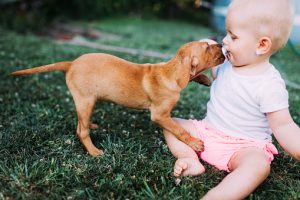Pandemic Puppies & Kids — Avoid Problems & Provide Rewards
During the Covid-19 Pandemic, people are rushing out to purchase or adopt puppies because they now believe they have plenty of time to spend with a puppy with work-at-home orders. Their children are also home and attending school online. I’m working with a lot of first-time puppy owners. I receive calls all too often that their puppies nip at their children anytime they run around, or play on the floor, or when the children hug or kiss the puppy on the face. When parents do not teach their kids that these are inappropriate, even dangerous behaviors with their own puppies, children can wind up getting seriously bitten by someone else’s dog that will not tolerate those same childish behaviors!
I want to help you avoid some common child and puppy training pitfalls. Here are a few suggestions:
NEVER allow your children to be in a room with your puppy unsupervised by a responsible adult — not even for a nano-second! Stuff happens, and it can happen quickly! IF you must leave a room where your puppy and children are playing, take the puppy with you! Prevent any possible behavior from either puppy or child that could result in a bite when you’re not watching everyone. Sometimes first-time puppy owners don’t realize just how sharp puppy teeth are. I have met a few children during this Pandemic who have gotten bitten awfully close to their eyes because they got in the puppy’s face after an adult left the room.
Never allow your children to get in the puppy’s face! This means: no hugging, no kissing, no roughhousing, no pulling ears or tails, no lying on the puppy, and no teasing the puppy by offering food and then taking it back! Also, be careful if your child is walking around with a cracker or cookie in his or her hand! Puppy may try to snatch it from the child. I also advise parents not to encourage children to play tug with their puppies; that is strictly a game for adults as it’s a competitive game! Kids get upset when their puppies run off with or chew their toys, so create a separate play area for the children where the pup is not permitted entry. Baby gates or playpens are an absolute necessity.
I do encourage parents to help younger children learn how to appropriately use their hands to touch, pet and offer treats. If your child is at least 18 months old, place him or her on your lap and put a treat in their palm, but… thread your own fingers under and through the child’s fingers making a wide-open hand. Encourage the child to instruct the puppy to sit. If the puppy sits, help the child reach toward the puppy with the treat in the child’s palm. YOU can prevent the child from “teasing” the puppy by backing his or her hand away, so be sure to keep the child’s hand still while the puppy takes his treat reward for sitting. Congratulate the child for feeding the puppy properly!
Older children from 5 years to 11 years tend to get into trouble with puppies. In order for your puppy to learn that your children are just as important as you are, I recommend that those children participate in feeding their puppies at least one meal per day, with close adult supervision. The child can be taught to measure the puppy’s food and place the food in the pup’s bowl (let the puppy see the child doing this). Teach your puppy to wait or stay. Then have your child bring the puppy’s food bowl to where the puppy eats and drinks. As the child begins to bend down to put that bowl on the floor, she or he can tell the puppy to wait or stay until the child places the puppy’s bowl on the floor. The child can then say “go eat” to give the puppy permission to approach the bowl, and the child then moves away. Your child can also be encouraged to check the puppy’s water, but don’t depend on the child to do that. Puppies must have free access to water, which should be filled all day long.
Create a reward system so your kids will be motivated to work with your puppy. Here is a suggestion: Place a blank calendar on your fridge with a magnet. Purchase some colorful stars from a novelty store. Each time your child does a chore that involves your puppy, she or he can earn a star. At the end of each week, if the child has a minimum of 7 stars (average of one star per day), whatever that child loves to do, (e.g., play on their iPad, or use their phone, or visit a favorite friend, etc.) give him or her the opportunity to earn extra time to have that fun experience . However, if the child does misbehave with your puppy, you can always remove a star (or more) off the calendar for that week.
Always acknowledge and reward good behavior, whether it is done by your children or your new puppy. Rewarded behaviors tend to increase.
Have fun 🙂
Renee Premaza, The Jersey Dog Trainer
